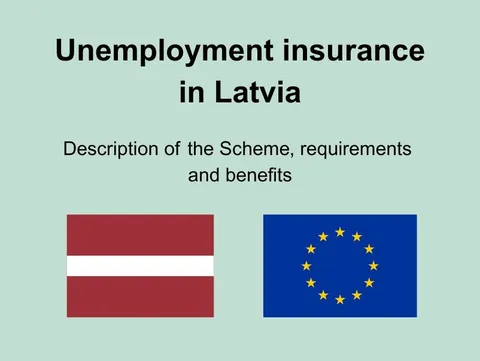EU
Latvia
Unemployment
Insurance
Unemployment Insurance in EU->Latvia
Unemployment insurance in Latvia
In this article you will find information on unemployment benefits (Bezdarbnieka pabalsti) in Latvia, social insurance contributions as well as formulas for calculating benefit amounts and pay-out periods.
In what situation can I claim?
If you have lost your job, you have the right to claim unemployment benefits (Bezdarbnieka pabalsti). Benefits are granted if you have worked for at least 1 year and social insurance contributions have been paid for at least 12 months during the last 16 months.
You can also claim unemployment benefits if you have regained work capacity after a disability or if you have been caring for a disabled child up to 18 years of age. In these cases the benefits are granted even if social insurance contributions have not been paid or have been paid for less than 12 months.
What conditions do I need to meet?
You can claim unemployment benefits if you have been granted unemployed status by the State Employment Agency (SEA) and you have been socially insured for at least 1 year and social insurance contributions have been paid for you for at least 12 months during the last 16 months.
If you have regained work capacity after a disability, in order to claim unemployment benefits you must obtain unemployed status within 1 month of regaining work capacity. If you are caring for a disabled child, you must obtain unemployed status within 1 month of the child reaching 18 years of age.
If you terminated employment relations on your own initiative or were dismissed due to an infringement, unemployment benefits shall be granted and paid not sooner than 2 months after obtaining unemployed status.
The unemployed are expected to cooperate with the State Employment Agency and carry out tasks listed in individual plan.
What am I entitled to and how can I claim?
Amount of unemployment benefits
Unemployment benefits are granted for 8 months.
The amount of benefits depends on your insurance (employment) history and the wage level from which social insurance contributions have been paid.
The average contribution wage is calculated based on your earnings for the 12-month period which ended 2 months before claiming unemployment benefits.
| Employment history in years (inclusive) | Benefit |
| from 1 to 9 years | 50% of average contribution wage |
| from 10 to 19 years | 55% of average contribution wage |
| from 20 to 29 years | 60% of average contribution wage |
| 30 years and more | 65% of average contribution wage |
Unemployment benefits are gradually reduced by increments of 3 months.
| Period | Benefit amount |
| First 2 months | 100% of granted benefit |
| Next 3rd-4th month | 75% of granted benefit |
| Next 5th-6th month | 50% of granted benefit |
| Last 2 months | 45% of granted benefit |
If prior to obtaining unemployed status you have been caring for a child aged up to 18 months, regained work capacity after having a disability, or cared for a disabled child aged up to 18 years, your granted benefits will be 60% of the double amount of the state social security benefit in effect on the day when the unemployment benefit is claimed. Currently this is EUR 274 per month for the first 2 months (state social security benefit EUR 137 x2 x60%), and accordingly to the algorithm mentioned above the amount decreases for next months.
Application for benefits
You can apply for unemployment benefits by:
- filling out an application form in person at any branches in Riga and elsewhere
- posting a completed form to the SSIA
- emailing a completed form signed with an e-signature to the SSIA
- along with requesting unemployed status, submitting a completed form in person at any State Employment Agency branch office, if it is no need for additional proof regarding your employment history
- e-application
If you have been employed up to 31 December 1995, you must additionally submit documents proving your employment history to the SSIA.
The portal Latvija.gov.lv has information in e-service format regarding your social insurance contributions and the amount of benefits, pensions and support payments you can claim using internet banking or your e-signature.
Jargon busters
Social insurance contributions are legally mandated payments paid into a special budget account which give the right to socially insured persons to receive social insurance benefits stipulated by law, including unemployment, maternity, paternity, illness and parental benefits, disability, old-age and survivor's pensions, and compensation for workplace accidents and work-related illnesses and healthcare services.
Insurance period - employment history and its aligned periods up to 31 December 1990, as well as the period from 1 January 1991, for which social insurance contributions have been paid for a person.
The following have rights to unemployed status: persons who are not employed, are seeking work, are capable of working, are at least 15 years of age, have not reached retirement age or are not receiving the old-age pension, are not receiving primary or secondary education full time, are not engaged in commercial activities and are not under full state care. Unemployed status grants the right to participate in State Employment Agency support activities.
Forms you may need to fill in
- Form for claiming unemployment benefits to be submitted in person to the SEA
- Form for claiming/recalculating unemployment benefits to be submitted to the SSIA in person, by post or email (signed with an e-signature)
Know your rights
See the links below for information on your rights if you become unemployed.
Employment in other European Union countries: information about social insurance contributions and periods if you have worked/lived in another EU country.
Latvian laws and regulations on receiving unemployment benefits:
- Law on Unemployment Insurance
- Law on Support for Unemployed Persons and Persons Seeking Employment
- Law on State Social Insurance
- Cabinet regulations on calculating contribution wages and granting unemployment benefits
European Commission publication and website:
Who do you need to contact?
State Employment Agency
Administration: K. Valdemara iela 38 k-1, Riga, LV-1010
Tel.: +371 80200206
Email: pasts@nva.gov.lv
twitter.com/NVA_gov_lv
Branches in Riga and elsewhere
State Social Insurance Agency
Lacplesa iela 70a, Riga, LV-1011.
Tel.: +371 64507020 (working days 8.30- 17.00)
Email: pasts@vsaa.gov.lv
Email for consultations: konsultacijas@vsaa.gov.lv
twitter.com/VSAA_LV
Branches in Riga and elsewhere
Ministry of Welfare
Skolas iela 28, Riga, LV-1331
Tel.: +371 80205100
Email: lm@lm.gov.lv
twitter.com/Lab_min
This page was last updated in 2024.
- Unemployment insurance in Europe →
Unemployment Insurance in Latvia
You might also be interested in:
⇒EU social security coordination
⇒Unemployment Insurance in the Nordic countries
Key points of EU Unemployment Insurance coordination
- Transferring periods of work and insurance between EEA countries As an EU citizen you can transfer acquired rights from Unemployment Insurance when moving between EU/EEA contries. In this way it may be easier to become entitled to unemployment benefit in the country you move to.
In the vast majority of the Member states the aggregation rule become fully applicable as soon as you starts to work in the country. However in Denmark, Belgium and Finland you must work some period there before you can use the aggregation rule.
You need a PD U1 document in the country you leave or if the involved countries use electronically exhange (EESSI) there will be issued a SED U002. The countries who issues the highest number of PD U1 documents are Germany, Austria, Switzerland and the Netherlands. The countries who receives most PD U1 documents are Lithuania and Italy. - Transferring unemployment benefits Under certain conditions you can go to another EU country to look for work and continue to receive your unemployment benefits from the country where you became unemployed. The period you can export your unemployment benefits varies from 3 to 6 months in the different Member states.
You have to apply for a PD U2 document in the country you leave, or if you haven't done that the institution in the receiving country must request a SED U008 from the competent institution in your last country.
The countries who issues the highest number of PD U2 documents are Germany, Switzerland, the Netherlands and Denmark. Poland is the country who receives by far most PD U2 documents. - Unemployment benefits coverage According to OECD the net replacement of income after 2 months of unemployment, for a single person without children whose previous in-work earnings were 67% of the average wage varies from 33 percent (Ireland) to 91 percent (Belgium). Read more here..
- Having residence in another EU country than where you work? According to EU social security coordination rules you must only be insured against unemployment in one country at a time. As a generel rule this country is where you work.
In Member states who have compulsory insurance, you will automatically be covered when you start working there.
However you may be insured by your country of residence if you are posted to a EU/EEA country or work in two or more EU/EEA countries at a time. In these situations you can not your self decide where to have unemployment Insurance, but you (or your employer) must apply for a PD A1 document which states in which country you are covered by social security, including Unemployment Insurance. Special rule also apply for cross-border workers ("frontier workers"). - Third-country Nationals working in EU/EEANON-EEA citizens are covered by Unemployment Insurance in the EU countries who have compulsory Unemployment Insurance. In countries with voluntary Unemployment Insurance (Denmark, Sweden and Finland) third-country nationals can become member of an Unemployment Insurance Fund.
In the most countries Third-country nationals can also use the EU Coordination rules when moving within EU/EEA (however not in Denmark, Iceland, Liechtenstein, Norway and Switzerland).
Third-country nationals in short-tem working relations often faces problems with actually get Unemployment benefits, even though they have contributed to the system. This is due to the fact that one normally need a residence permit which allow one to take any job, and also because of a qualifying period in most countries between 6-12 months.

